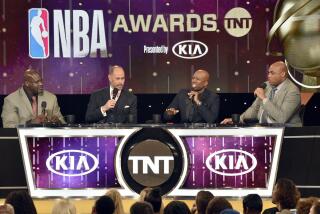Shaquille Is an Inadequate Replacement for Jordan
- Share via
Michael Jordan is gone and the National Basketball Assn.’s marketing folks have replaced him with Shaquille O’Neal.
Sorry.
No sale here.
We shouldn’t blame the marketeers. They have a job to do and they do it well. We can lay some blame on the league’s media sycophants. They create new heroes to write about and talk about and put on the covers of their slick magazines. They do it because there’s nothing more useless than yesterday’s news, and Jordan is yesterday’s news.
So the NBA and its fellow travelers have moved on. They have anointed a successor to Jordan as Pro Basketball Icon. He is the very good player, very likable guy and world’s tallest rapper, the smiling Shaqman.
Well, OK.
Sell your best stuff.
But let me ask something. Am I the only one or does anyone else think the NBA has lost what made it special?
The selling of Shaquille O’Neal rings false to me because it carries an air of business as usual. The king is dead, long live the king.
Don’t bring that weak stuff in here.
It’s not business as usual. Certainly, teams will continue to have great players; the NBA will fill arenas; the TV and marketing dollars will be there.
But it can’t be the usual business without Michael Jordan, the best there ever was or will be. If we add Magic Johnson and Larry Bird, it’s clear the business has lost more than just three players.
What it has lost is irreplaceable.
It has lost genius.
The genius of Jordan is that he, like Magic and Bird, created moments of performance so unexpected, so unimagined even, that when we saw them we needed to see them again to be certain we had seen them.
It’s why people go to the Vatican and stand in line for hours to walk into the Sistine chapel. A man painted that ceiling? One man did that?
Nothing in any kind of performance on any stage anywhere in the world matches the magic of a moment when a great athlete’s life’s work enables him to exceed even his own expectations with a maneuver born of imagination, spontaneity and pure physical genius.
Devon White catches a line drive high against a fence.
Wayne Gretzky sees a six-inch space and hits it from 30 feet.
Paul Azinger holes an impossibility from a bunker to win.
Barry Sanders spins 180 degrees with one hand on the turf and leaves professional tacklers grasping at the space he once occupied.
Steve Young, back to pass, seeing his throw batted in the air, sprints 10 yards and dives to catch his own pass.
You can have Sinatra, Streisand and Snoop Doggy Dogg (to name another rapper, a shorter, indicted one). They never did one thing better than a thousand things we see in sports every year.
Once upon a sweet time, every full-blooded basketball fan needed to be within reach of a television set when ESPN rolled the NBA highlights.
Every night without fail, every night of every season, every single night, there would come a moment in the highlights that would be so full of magic and yet so routine that while ESPN would show us the moment, the commentators would not even take note of what we were seeing.
Instead, they would say something like, “And Michael, here scoring two, wound up with 41 to lead the Bulls . . . “
Michael Jordan is gone and we’re the poorer for that. We’re poorer because sports is poorer and nowhere is performance more thrilling than in our stadiums and arenas. Without Jordan, the performances, however great they may be, are less than they were.
Basketball without Jordan is art without Picasso, music without the Beatles.
It’s one thing to lose the surprise of discovery; but the great ones give us more than just surprise. They give us the surprise of the unimagined discovery; they show us new ways to think of life’s possibilities.
Every single night, Michael Jordan did something with a basketball that no one had ever imagined doing.
I saw this. Jordan’s on a break with the ball. Left side of the key against the Timberwolves. He leaves the floor a step and a half inside the free-throw line. He is floating toward the basket--and a defender rises with him. So Jordan does a thing. He turns his back to the guy. Now he is floating backward.
Floating backward, Jordan holds the ball away from his body at waist level in his right hand. Don’t ask me why. I never asked, though I wish I had. But here’s what he did then. With the ball lying on the palm of his right hand, Jordan uses his left hand to slap his right wrist.
Slaps his right wrist--and pops the ball into the air. All this while floating backward at the end of a break. All this with a defender right there. All this while being unable to see the basket. And he slaps his right wrist to pop the ball into the air--and into the basket.
More to Read
Go beyond the scoreboard
Get the latest on L.A.'s teams in the daily Sports Report newsletter.
You may occasionally receive promotional content from the Los Angeles Times.










